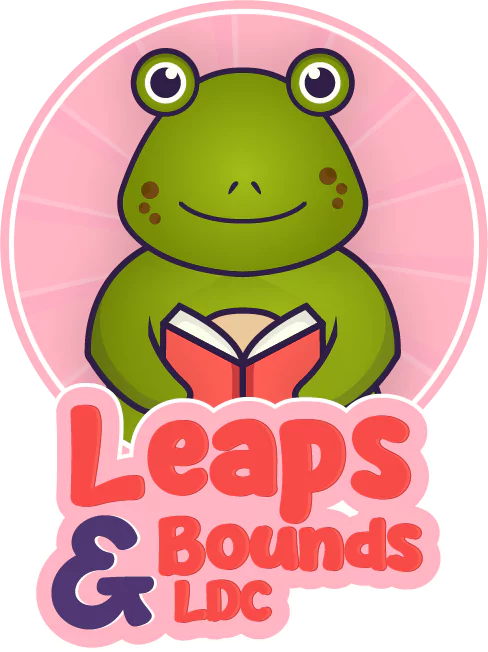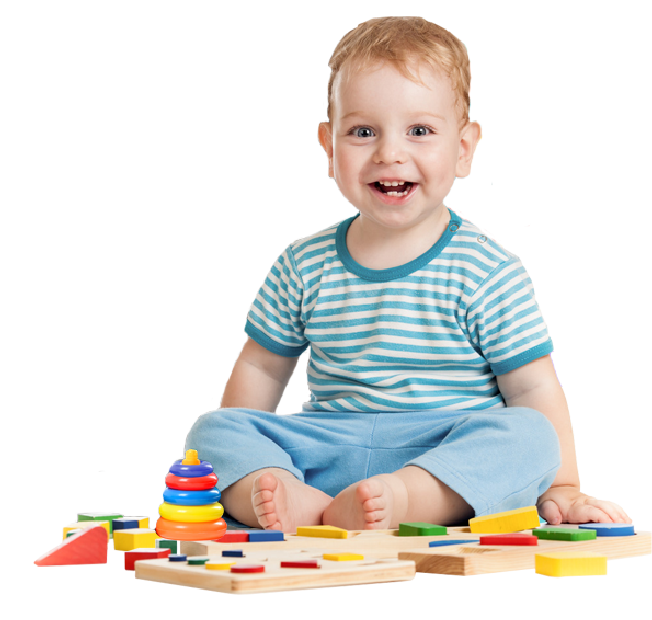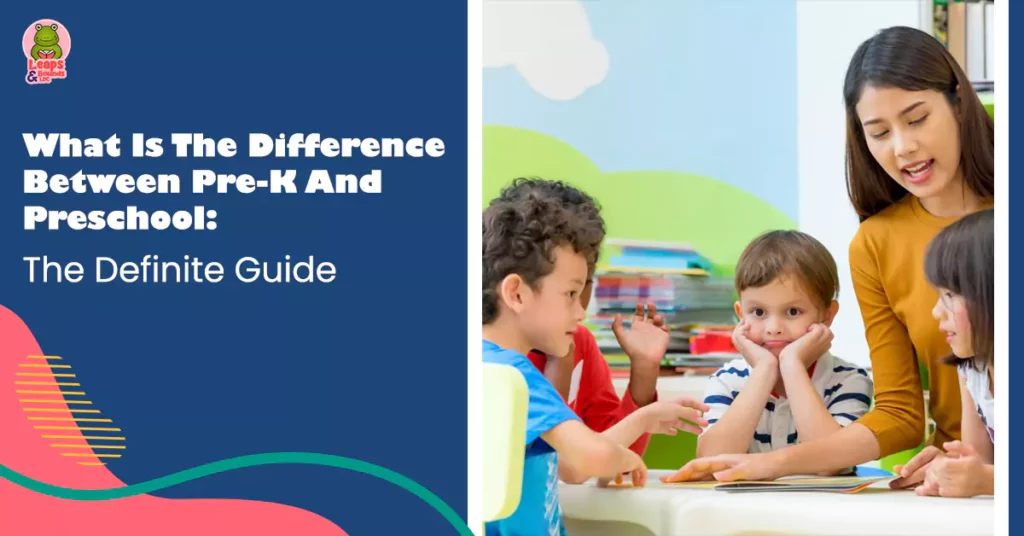Pre-K And Preschool are frequently used interchangeably, perplexing parents and teachers.
To select the best Preschool for children, it is crucial to comprehend their primary distinctions. This definitive guide looks closely at the critical difference between Pre-K And Preschool to help clarify informed decision-making.
What Is The Difference Between Pre-K And Preschool
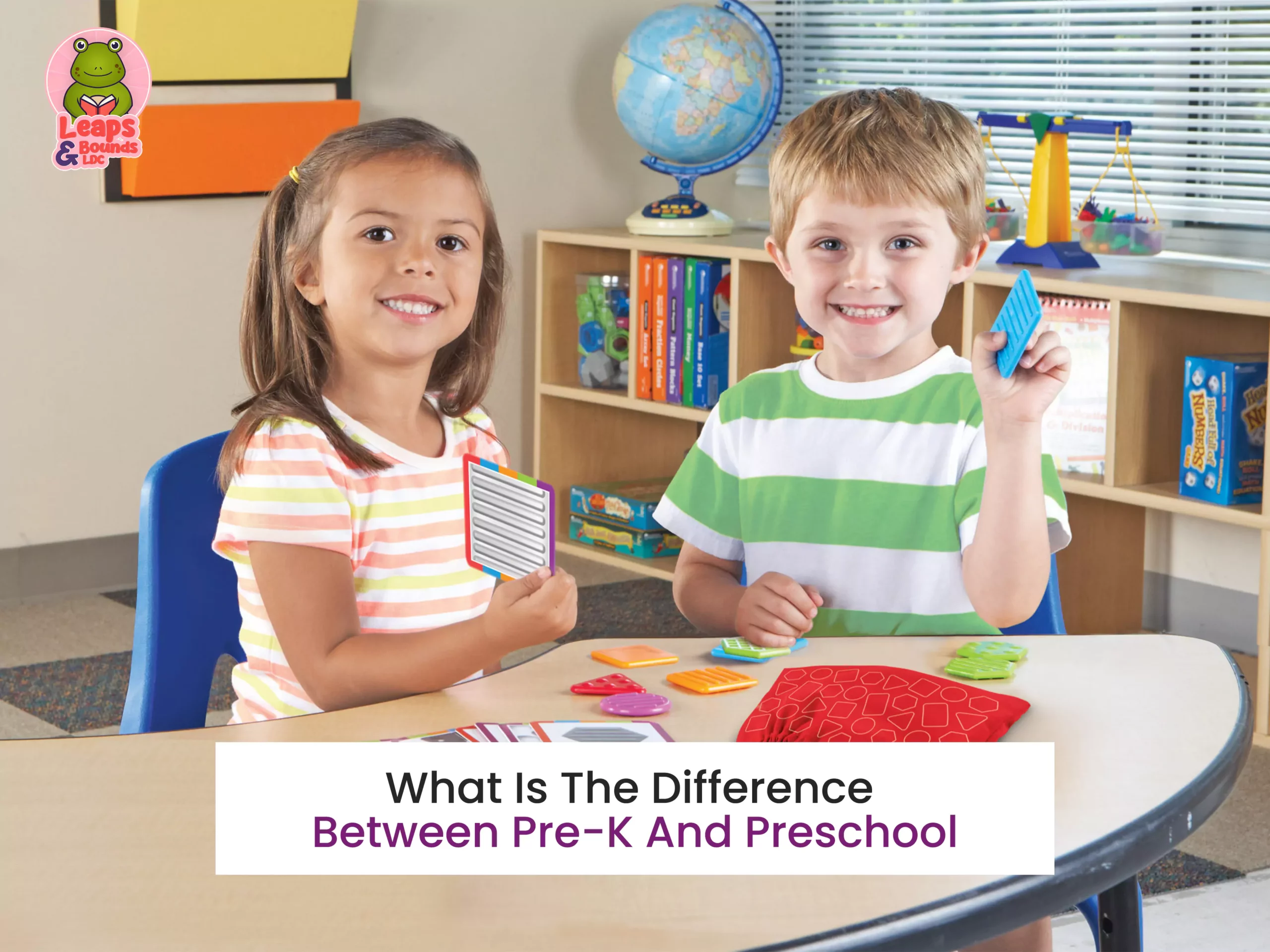
Their early schooling significantly shapes a child’s developmental path. However, the terminology used for different educational programs might need to be clarified for parents and guardians.
This section seeks to define the differences between two often used languages: Pre-K and Preschool.
-
Preschool
For kids ages two to four, kindergarten is a preschool education program. Through fun learning, the emphasis is on fostering social, emotional, and cognitive abilities.
Children are encouraged to participate in various hands-on activities, storytelling, and art projects at daycare facilities.
They place a strong emphasis on encouraging children’s natural curiosity and creativity. Kindergarten is a great place to start preparing a kid for school despite not being required.
-
Pre-K (Pre-Kindergarten)
Pre-K, or pre-kindergarten, is a type of educational program usually targeted at children between the ages of four and five. Pre-K, as opposed to Preschool, provides more of an emphasis on academic kindergarten preparation.
Preschoolers participate in organized learning activities that introduce basic literacy and numeracy concepts and prepare them for a more formal learning setting.
Pre-K focuses on developing skills necessary for success in school and acts as a transitional stage between Preschool and kindergarten.
What Is The Difference Between Tk Vs Kindergarten
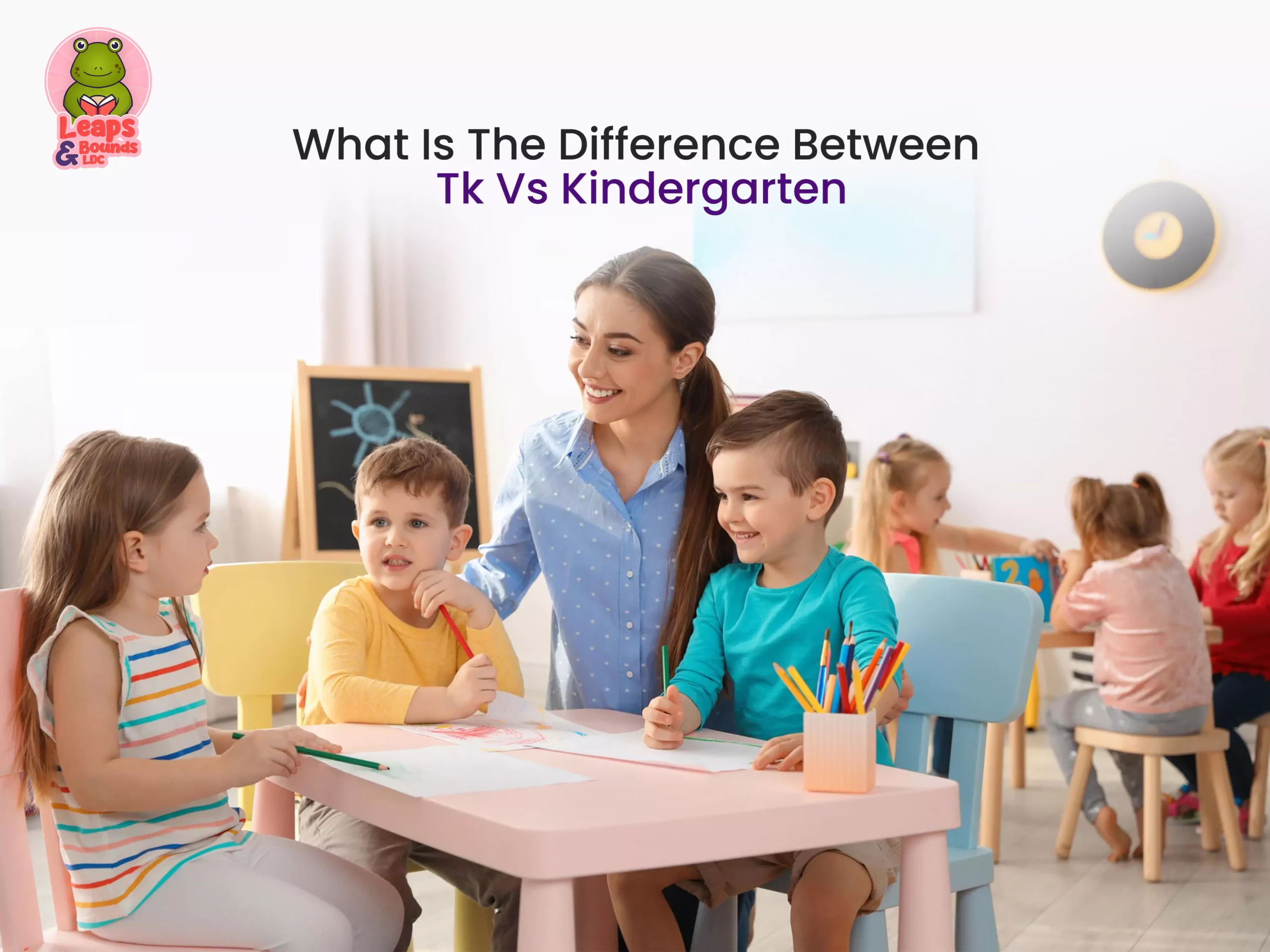
Now, let’s understand the difference between Tk and Kindergarten. By understanding their unique features and purposes, parents can make well-informed decisions about which program best suits their child’s needs.
-
TK (Transitional Kindergarten)
TK, or Transitional Kindergarten, is a unique program some school districts offer. It is provided mainly in the United States.
It is designed for kids who are too advanced for traditional kindergarten but have yet to achieve the age requirement for kindergarten.
TK acts as a bridge between Preschool and kindergarten for kids who can benefit from an additional year of social and intellectual development.
The transition to kindergarten is more straightforward, and kids are better equipped for the difficulties of primary school education.
-
Kindergarten
The first year of formal education is kindergarten. It is typically focused on the transformation the children’s department wants.
They serve as the initial elementary school years and provide instruction in fundamental academic subjects, including reading, writing, and basic math.
The kindergarten created the groundwork for a thorough description by emphasizing social care and instruction. Many federal states require children to attend kindergarten, which serves as the introduction to their obligatory education.
What Is Pre-K 2
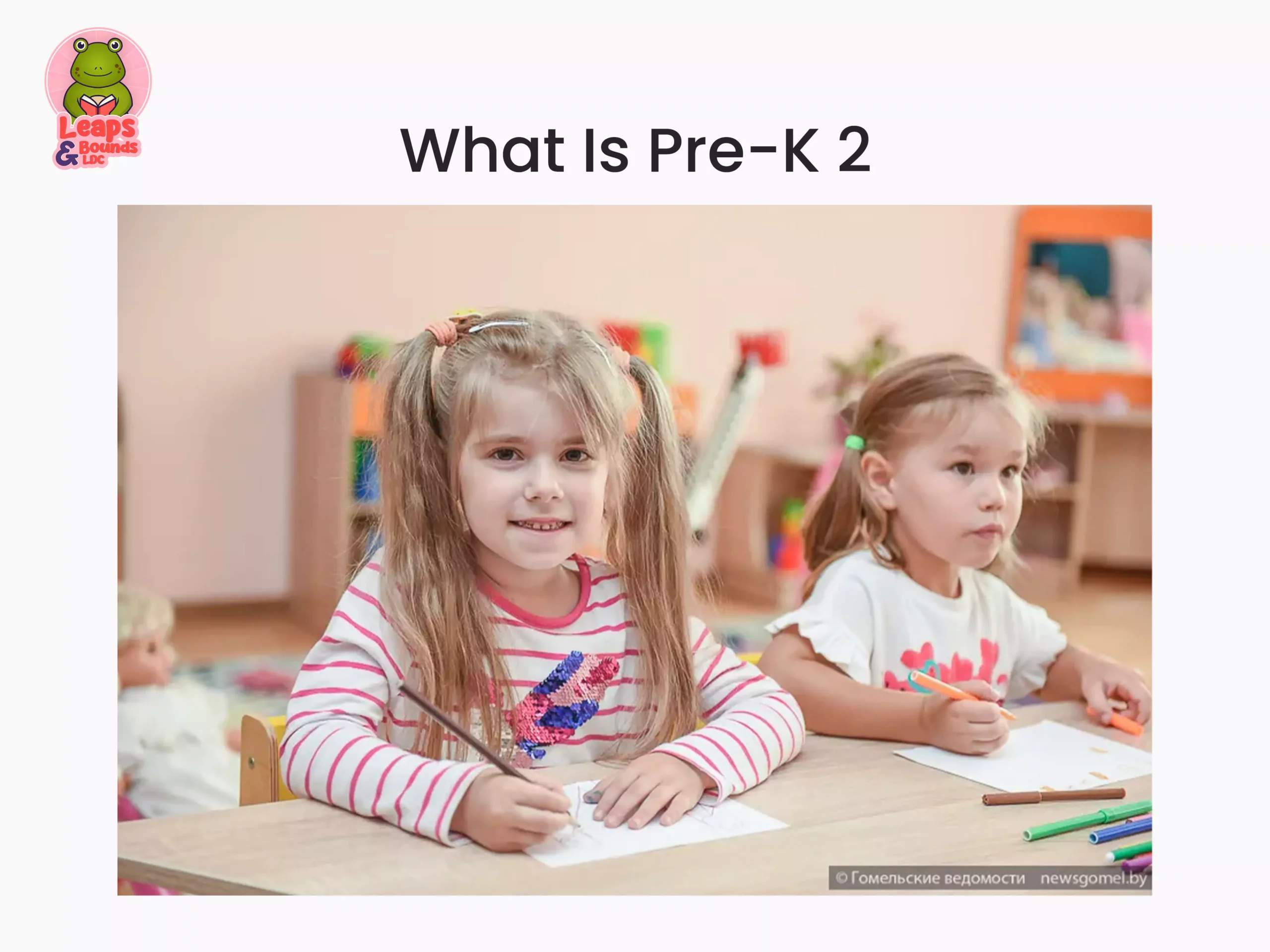
Pre-K 2, commonly referred to as Pre-Kindergarten 2, is an early childhood education curriculum for children between the ages of four and five.
Children concentrate on building fundamental abilities between kindergarten and first grade to prepare for formal school.
Children engage in activities in Pre-K 2 that encourage social interaction, fundamental reading, and numeracy. It laid the groundwork for a smooth transition to kindergarten.
It puts children on the route to academic achievement by assisting them in growing their sense of independence and self-assurance. It also makes them excited about studying.
When Should My Child Start Preschool
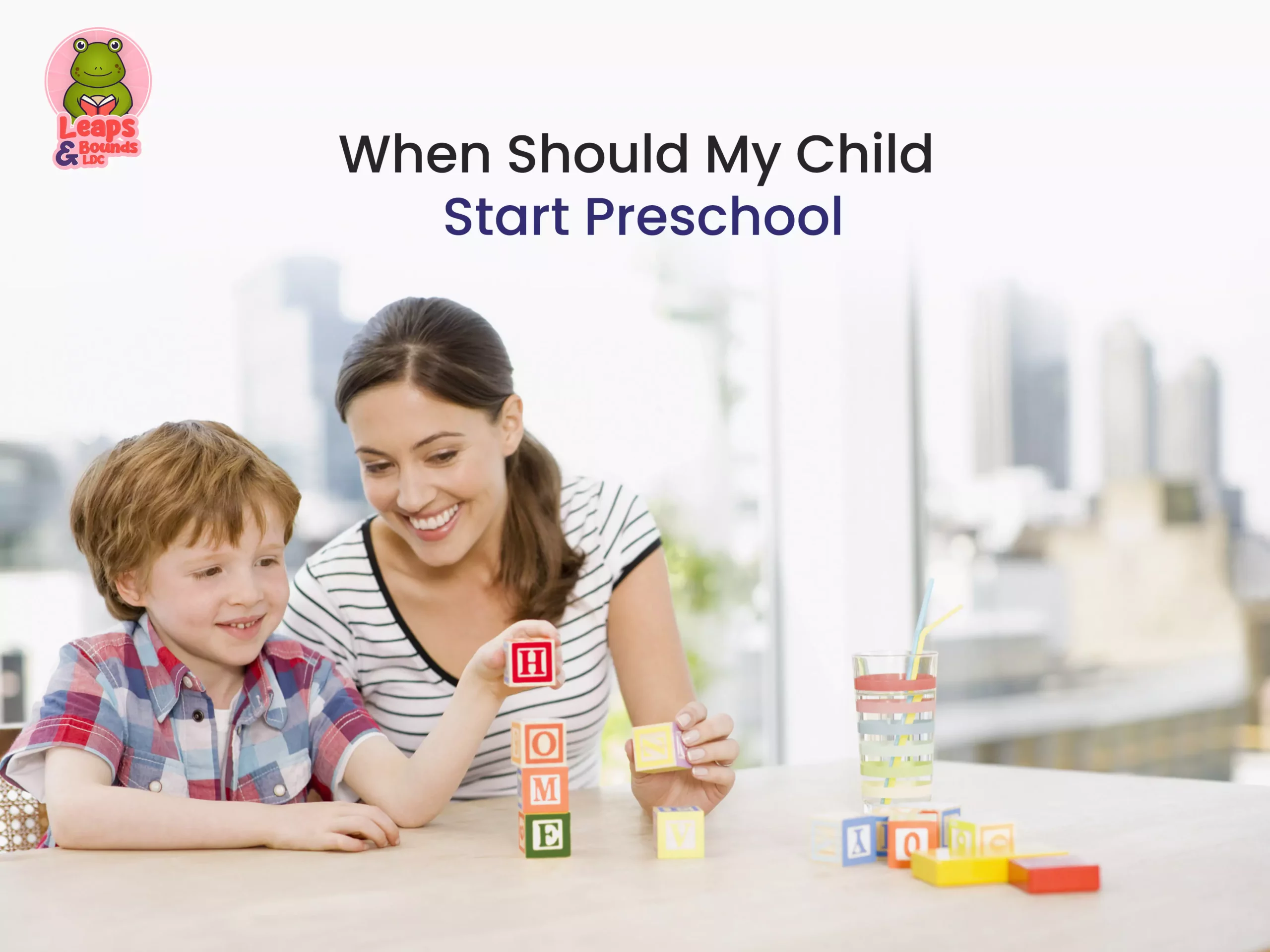
Around two to four years old is often the optimal age to begin Preschool. However, the enrollment regulations of the Preschool and each child’s readiness can cause this to change.
Children are usually accepted into preschools around two when they can profit from social interactions and play-based learning.
Starting Preschool at this age puts children on the right track for future educational experiences. It helps them develop crucial social and emotional skills.
When deciding when to enroll your kid in school, evaluating their readiness and speaking with the preschool teachers is critical.
Pre-K Or Preschool: Which Should Your Child Attend
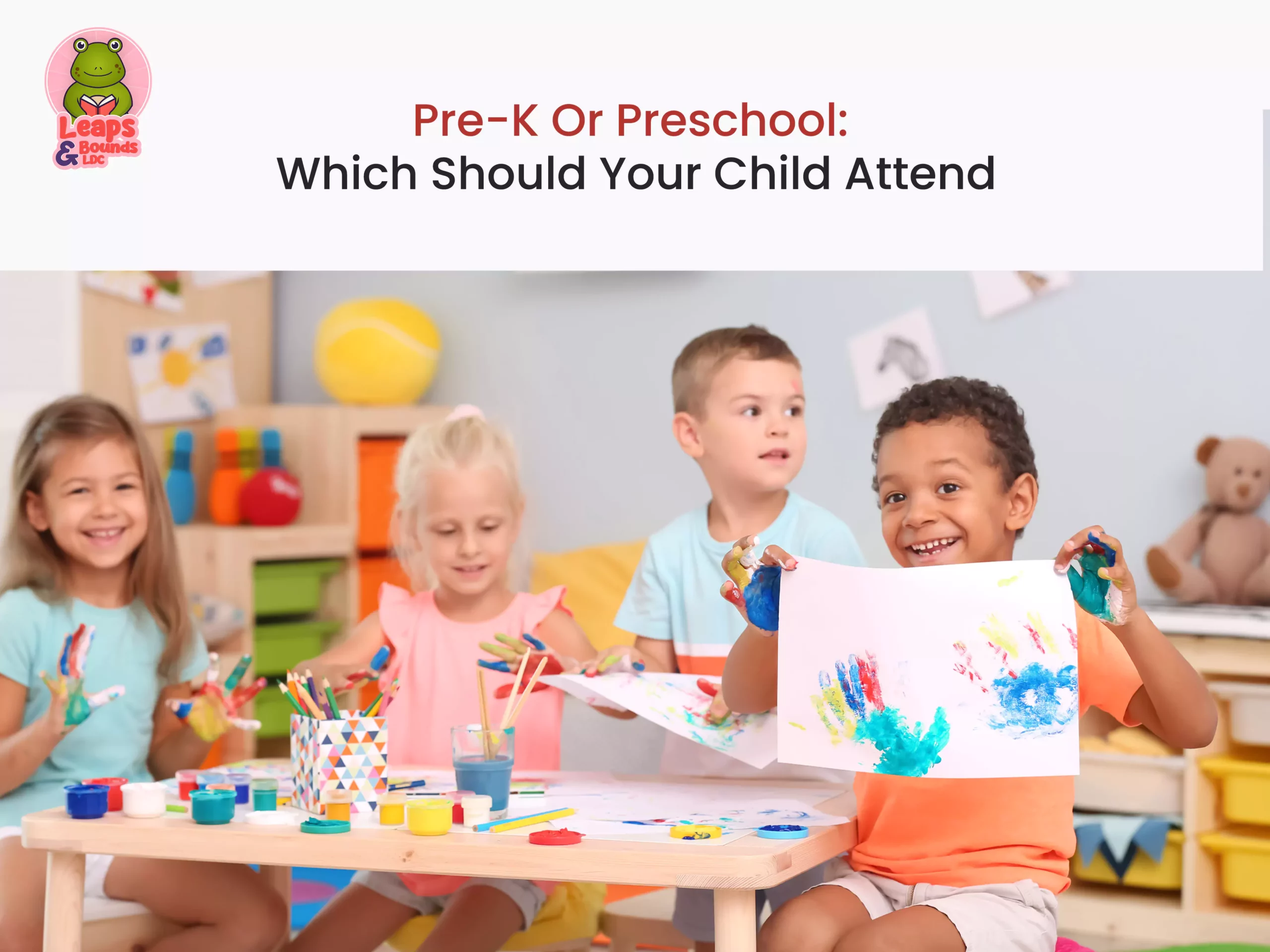
Selecting between Preschool and kindergarten is crucial for your child’s education.
Preschool, intended for kids aged 2-4, emphasizes social and cognitive growth via play-based activities. It gets them ready for a more formal setting.
The first year of elementary school, kindergarten, is for kids ages 5 to 6, and it emphasizes academic concepts like reading and math.
Although both programs are compulsory, Preschool is the equivalent of kindergarten. Consider your child’s age, developmental ability, and educational objectives to pick the best choice.
Early childhood education must consider your child’s needs and interests to lay a solid basis for future learning.
Are Pre-k And Preschool Required: The Goods And Bads
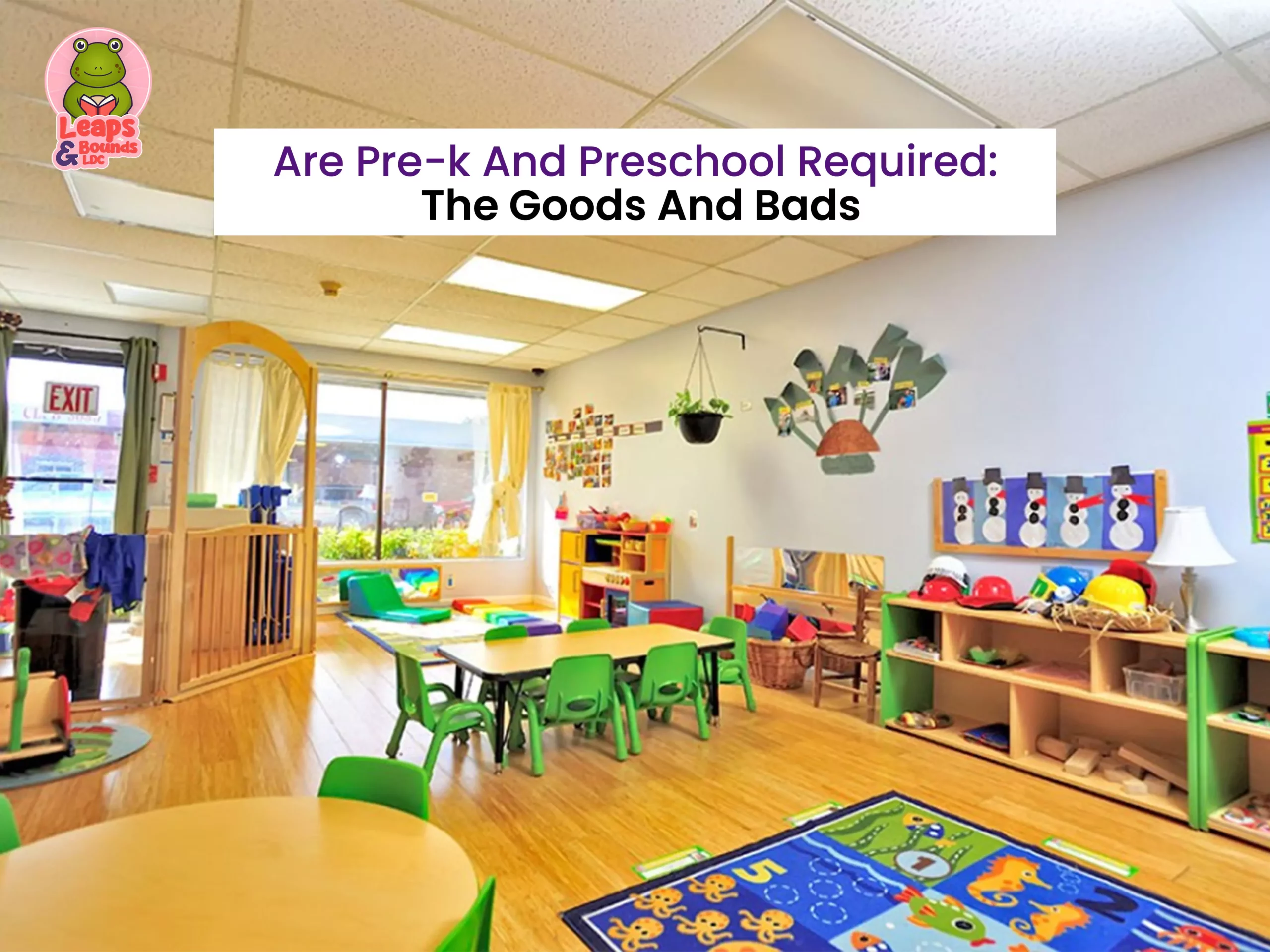
Learn about the value of Pre-K and Preschool in developing children’s minds. Let’s explore the advantages and factors associated with these essential early education options.
-
Are Pre-K and Preschool Required?
Pre-K and Preschool are not required in many nations, but they offer children beneficial early education opportunities. These programs are growing more and more well-liked.
This is because of their beneficial effects on children’s development, even if participation is not required. Depending on their family’s requirements and educational preferences, parents can select whether to enroll their children in Pre-k or Preschool.
-
The Benefits of Pre-K and Preschool
For young children, Pre-K and Preschool have several advantages like daycare. Through interactive play and supervised activities, these early childhood education programs strongly emphasize the development of social, emotional, and cognitive abilities.
The basis for future social interactions is laid by children learning how to connect, communicate, and form friendships.
As well as increasing preparation for school, early exposure to learning concepts like letters, numbers, and colours encourages a love of learning.
-
The Downsides of Pre-K and Preschool
Despite their benefits, Pre-K and Preschools also have some drawbacks. For some families, paying for tuition might be challenging, and the availability can vary by location.
Not all early childhood education and preschool programs also adhere to higher educational requirements.
Some kids struggle with adjusting to a structured school setting or experience separation anxiety. However, with enough time and help, these difficulties are frequently manageable.
-
The Importance of Pre-K, Preschool, and Child Daycare
The early years of a child’s education are crucially essential, as are Preschool, Pre-K, and childcare.
These places give kids a secure and engaging setting to learn new things and acquire valuable skills. Attending kindergarten can assist kids in developing their social and intellectual abilities and lay a solid basis for their future schooling.
On the other hand, childcares guarantee that the kids are adequately cared for while the parents are at work and serve as a vital source of support for working parents. Prioritizing early childhood education helps parents support their children’s overall growth and well-being.
Is Kindergarten Preschool Or Elementary
Kindergarten is a part of the elementary education system. It is the first year of formal schooling for children, typically for those aged five to six years old.
While Preschool is an early childhood education program for younger children aged two to four, kindergarten is the beginning of elementary education.
Children pick up fundamental academic abilities in kindergarten, including reading, writing, and basic math principles. As well as social skills and peer cooperation.
A child’s education in the following years of the upper primary school grades is built on the foundation they get in kindergarten.
Similar points in Pre-K and Preschool
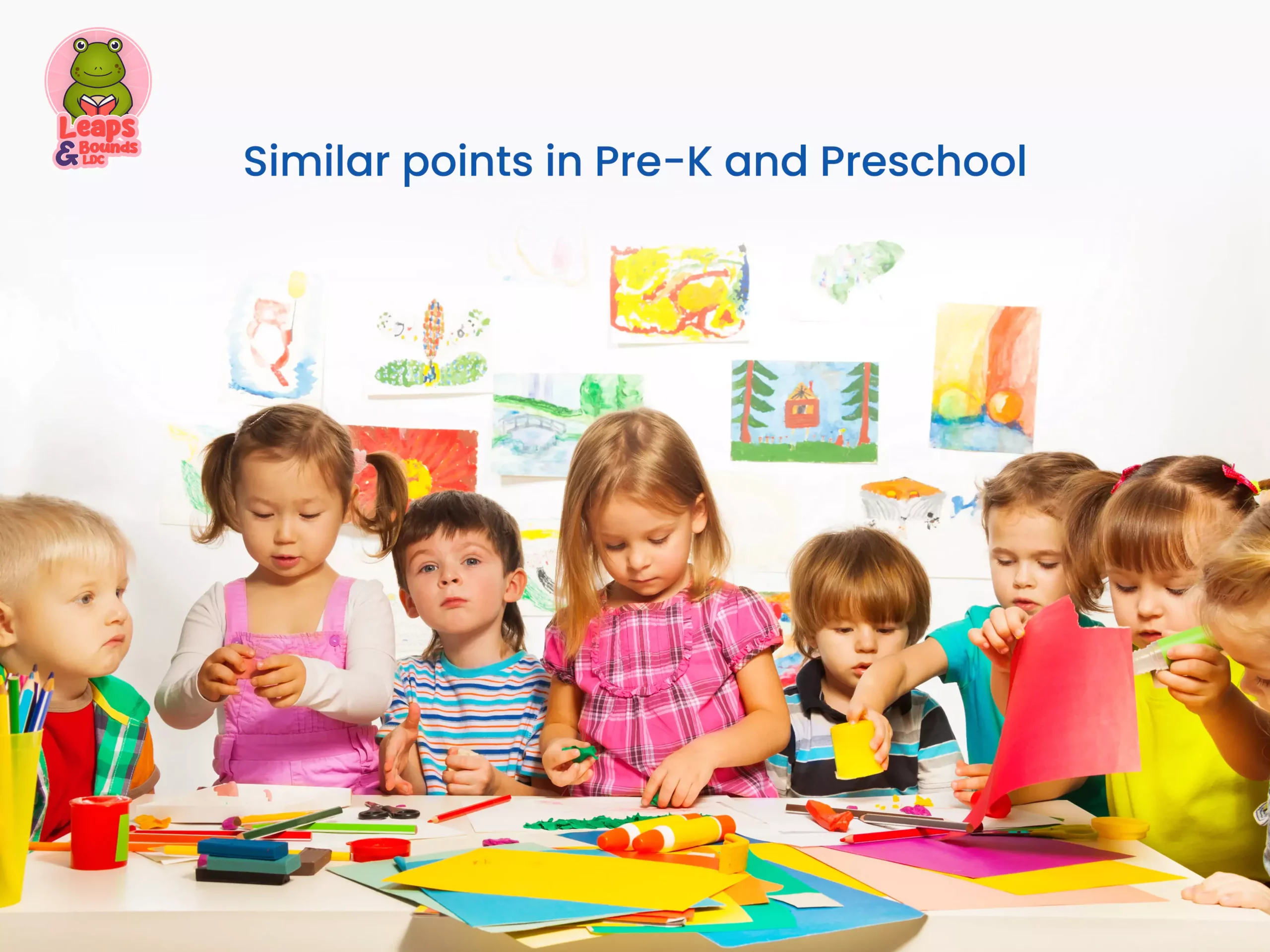
Preschool and Pre-K are crucial phases in a child’s early education. These educational phases build fundamental abilities and lay a basis for future students. Thus, there are parallels between them.
-
Age Group
Young children between 3 and 5 should attend pre-K and Preschool.
-
Early Childhood Education
Both initiatives emphasize early childhood education to get children ready for school.
-
Social Development
Children develop vital social skills, including sharing, cooperating with others, and taking turns at preschool and pre-K age.
-
Play-Based Learning
Both organizations frequently include children in practical exercises that foster imagination and creativity. This happens via the use of game-based learning techniques.
-
Basic Concepts
Children are introduced to fundamental ideas like numbers, colours, shapes, and letters in Preschool and pre-K.
-
Language Development
Both programs encourage language development with the help of storytelling, music, and interactions with classmates and teachers.
-
Physical Activities
It encourages the development of motor skills and physical fitness. Preschool and pre-K typically include physical activities like outdoor play or gym time.
-
Cognitive Skills
Children in both environments participate in activities that foster cognitive abilities, including memory, critical thinking, and problem-solving.
-
Emotional Support
Teachers and kindergarten students offer emotional support and a supportive setting so kids can feel comfortable.
-
Parental Involvement
Both programs frequently promote parental participation. It enables parents to get involved in events or stay informed about their child’s development.
Why We Are The Best Daycare And Preschool For Your Child
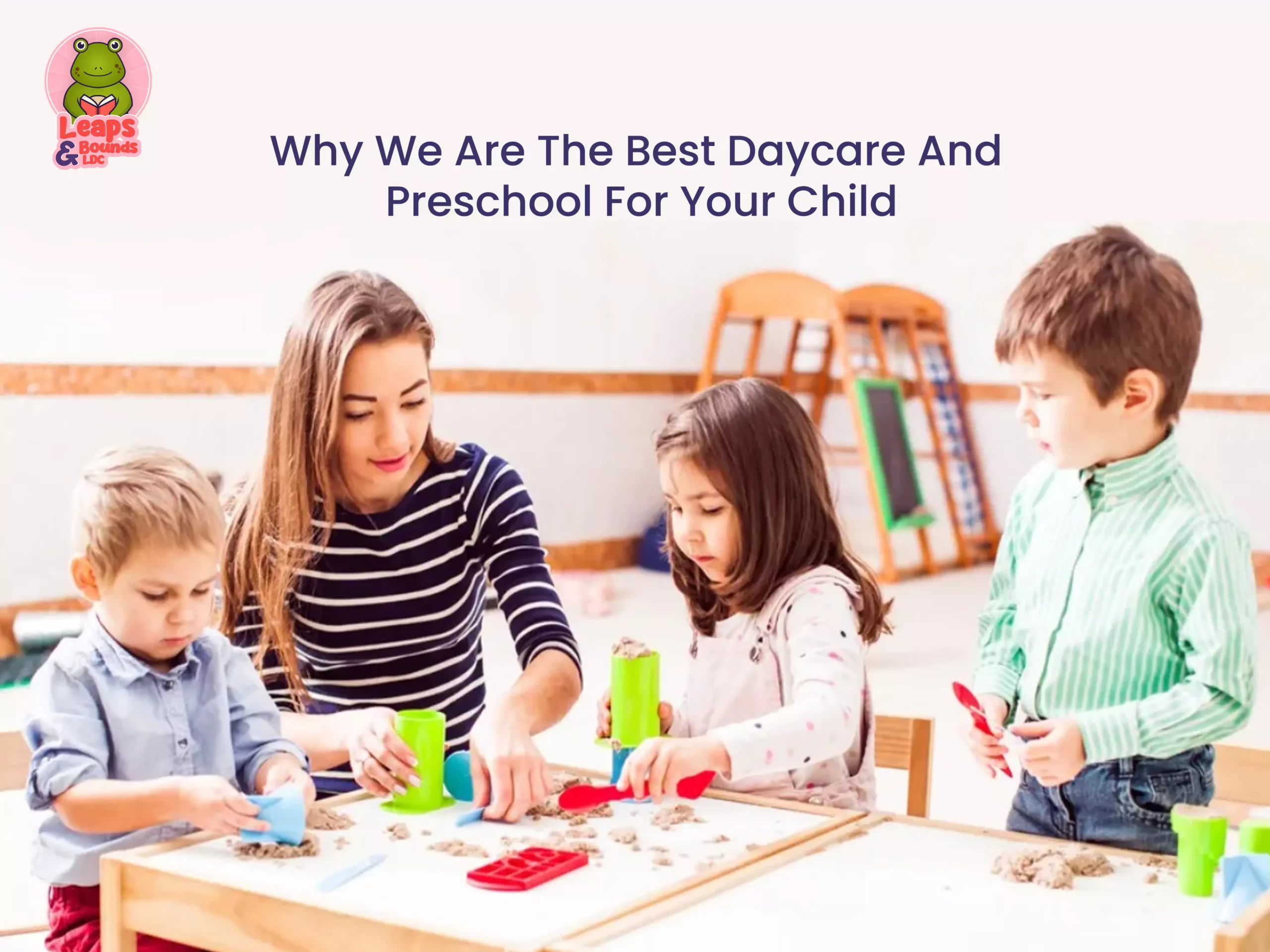
In Somerville, South Carolina, Leaps and Bounds offers specialized child care that promotes holistic development in a secure setting. Thanks to an age-appropriate program and kind personnel, your child will prosper and grow together with us.
-
Expertise and Experience
We provide top-notch childcare services for infants and toddlers in Summerville, South Carolina, thanks to our excellent staff of skilled nannies.
-
Parent-Centered Approach
We wish to relieve parents by giving their children the best possible care since we understand how crucial it is to find the right daycare.
-
Positive Learning Atmosphere
At Leaps & Bounds, it’s essential to establish a love of learning in children at a young age and to set them up for success.
-
Safe and Caring Environment
You can feel confident that our dedicated staff will provide your child with a careful and loving environment. We make sure to ensure their safety.
-
Age-Appropriate Curriculum
From infants to four-year-olds, we conduct different events. We adapt the curriculum, toys, and resources to the developmental stage of each child, fostering the best possible learning environment.
Contact us now to give your child the best possible environment!
Conclusion
Even though pre-K and Preschool serve young children, there are some minor distinctions between the two. Preschool lays more emphasis on social and emotional development via play-based learning.
On the other hand, pre-K often focuses more on academic preparation for kindergarten. It applies a firm foundation for a child’s future educational path.
